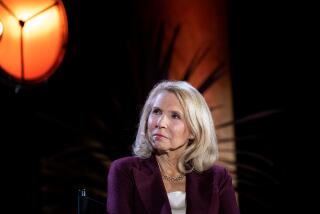Fuchs’ Fall Is as Dramatic as His Rise Was Meteoric : Hollywood: Ouster sparks sadness, cheers. Sources say Time Warner music chief crossed chairman at wrong time.
- Share via
Amid the glitter and flash of the Emmy Awards in September, Michael J. Fuchs, the chairman of Home Box Office, was singled out in the speeches of the winners more than any other Hollywood executive.
It was a moment of glory for the premium cable channel, which came to the Pasadena gala with more nominations than even ABC. But Fuchs fumed for days afterward, incensed that Barbra Streisand had failed to acknowledge him in accepting her award for an HBO concert.
The tirade was classic Fuchs. Over the last decade, the Time Warner Inc. executive had built HBO into the world’s mightiest pay television channel with equal parts hubris, brilliance and intimidation. His rise was meteoric. And when Chairman Gerald M. Levin assigned him to fix the troubled music group in May, some at Time Warner believed--and many feared--that he was next in line to run the world’s largest entertainment company.
But Fuchs’ overweening confidence finally did him in, illustrating just how quickly a soaring entertainment career can crash to earth. After nearly 20 years at Time Warner, the 49-year-old Fuchs was unceremoniously ousted in a corporate restructuring that left him jobless Thursday.
While brash toughness cleared a speedy path for Fuchs to the top--and presumably could fuel his rise again--Time Warner executives and Wall Street analysts say he became blinded by his own success. “He started believing his own press,” said one source.
His ouster shocked Time Warner officials and Wall Street experts. The mood at HBO, which Fuchs ran like a Marine boot camp and where he inspired fierce loyalty, was dark. But rounds of cheers rose up within the music group, rocked over the last year by a series of executive firings, several carried out by Fuchs.
“Ding dong, the witch is dead,” sang one senior Warner Music executive gleefully.
Few in the entertainment industry were privately surprised that the Bad Boy of HBO, with the menacing sneer and the Napoleonic strut, had fallen. “You could see this coming,” said one Wall Street source. “Fuchs burned bridges with Jerry and with the board by fighting city hall. The cumulative damage couldn’t be reversed.”
Levin did not return repeated calls to his office. Fuchs, who until Thursday was chairman of both Warner Music and HBO, issued a statement. “I’ve loved this company for the nearly 20 years I’ve been here,” he said. “I’m proud of my record and for what we all built first at HBO and the efforts and accomplishments we have made at Warner Music Group in the last six months. I’m particularly disappointed not to have been able to finish my tasks at Warner Music Group and I am deeply saddened to leave Time Warner.”
As one of the three highest-paid executives at Time Warner, Fuchs will get a settlement in the millions.
Sources at Time Warner say it was not the spate of public firings at Warner Music or Fuchs’ take-no-prisoners management style that got him in trouble. In fact, Levin is said to be pleased with Fuchs’ housecleaning at the world’s largest music company, which was reeling from the ousters and resignations of longtime music executives including Mo Ostin.
Rather, Fuchs’ fatal flaw was in overestimating his own importance at an inappropriate time. Fuchs, sources say, crossed Levin this fall during sensitive negotiations of the company’s proposed merger with Turner Broadcasting System, chilling what had been a guarded but respectful relationship between the two.
“Jerry’s great strength and great weakness is that when he believes that something is strategically important for the company, he lets nothing stand in his way,” said one source close to Time Warner. “Fuchs got in his way.”
Sources say Levin was particularly infuriated in the weeks leading up to the merger announcement in late September when he suspected that Fuchs had planted stories in the press about executive opposition to the transaction.
“During the Turner negotiations, there was a level of ego and lack of sophistication on Michael’s part that was surprising,” said one Time Warner source. “Michael felt very powerful, when in reality he was just like everyone else.”
Time Warner sources say Fuchs became unhinged at the prospect of losing the music group or HBO as part of the merger. Levin was interested in moving HBO to Turner to join his other cable networks, such as Cable News Network. Having yet to sign his Warner Music contract, Fuchs threatened to leave the music group if HBO was forced to report to Turner.
Sources close to Fuchs said he was also upset that he had found out about the merger secondhand rather than from Levin.
But Levin called his bluff and shut Fuchs out of the ongoing negotiations, despite Fuchs’ role as a Turner board member and head of the compensation committee. Levin demanded that Fuchs stop talking to the press, and even voiced displeasure over the situation to his board of directors.
“Levin gave Fuchs another chance,” said a Time Warner source.
But Fuchs deepened the wound by agitating against Levin’s leadership at Turner’s headquarters in Atlanta and by trying to undermine a plan to give over Fuchs’ cherished HBO to President Jeffrey Bewkes. According to one source, Fuchs turned on Bewkes, his chief lieutenant, after the HBO president tried to settle a long-brewing feud between HBO and Warner Bros. studio by trying to make peace with the latter’s heads, Robert Daly and Terry Semel.
Fuchs had done battle with the two since Time Inc. and Warner Communications merged in 1980. Fuchs saw himself as the creative kingpin of Time Inc., but was eclipsed in that role by Semel and Daly.
Some industry sources speculated that Fuchs will now seek a job as a studio head. “Michael desperately needs to run a studio to show Bob and Terry he can do it better,” said one Wall Street source.
Born in the Bronx but reared in the wealthy Westchester suburbs of New York, Fuchs earned a law degree at New York University and practiced corporate law briefly before a stint at the William Morris talent agency’s New York office. He joined HBO in 1976 and became its chairman and chief executive in 1984.
Fuchs worked miracles at HBO at a time when the videocassette recorder threatened to annihilate the pay movie business. He invented a new economic architecture that enabled HBO to finance original programming by selling foreign rights and “multiplexing,” giving viewers several satellite feeds to choose from at the same time. To this day HBO has the highest profit margins of any Time Warner division.
But he was wasn’t rising fast enough. When he complained to Levin about being passed over for the presidency of the company, Levin tossed him the harrowing assignment as head of music. On the job just six months, Fuchs operated with a brash style that gave even some admirers pause.
Warner executives were aghast at the way he fired domestic music chief Doug Morris, who was handed a press release noting his termination at a meeting with Fuchs scheduled to flesh out the details of his promotion announcement.
Security guards followed Morris back to his office at Time Warner headquarters, where they stood watch outside his door before escorting him from the building. Fuchs fired his other top domestic executive, Melvyn Lewinter, in a similar way and Fuchs soon pressured others to resign. Both Morris and Lewinter sued Time Warner.
Fuchs also ordered executives to stop talking to reporters and regularly inspected their phone logs.
Fuchs cleaned up at least one headache for Levin. After months of political pressure, Fuchs dumped Interscope, the rap music label that raised the ire of women’s groups and politicians.
While many in the industry questioned Fuchs’ decisions, he was not without his fans, including several top executives at Warner Bros. Records and Atlantic Group.
“I’m saddened about Michael’s departure,” said Liz Rosenberg, senior vice president of Warner Bros. Records and Madonna’s close friend. “He came in and gave a pep talk to the troops after he took over. I think he was very good with artists too. Madonna is very fond of him.”
Several HBO executives, who marveled at his charisma and leadership, were crushed. “He made HBO a crusade,” said one. “He was everyone’s center of gravity.”
But the view in the music group was much less charitable. Said one executive, “He was an arrogant and vindictive bully who tried to intimidate grown men into subservience. In my opinion, he got what he deserved.”
More to Read
The biggest entertainment stories
Get our big stories about Hollywood, film, television, music, arts, culture and more right in your inbox as soon as they publish.
You may occasionally receive promotional content from the Los Angeles Times.










